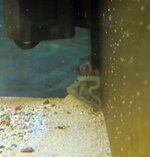-
Looking to buy a cephalopod? Check out Tomh's Cephs Forum, and this post in particular shares important info about our policies as it relates to responsible ceph-keeping.
You are using an out of date browser. It may not display this or other websites correctly.
You should upgrade or use an alternative browser.
You should upgrade or use an alternative browser.
She laid eggs...
- Thread starter petromir
- Start date
Most of my females came out on their last day or two and moved about the tank restlessly (similar to male senescence). I did have an O. mercatoris to live 11 weeks beyond hatching and we have seen a few of O. mercatoris live longer than other species after brooding (we have also seen them die within a day or two of hatching though) but that is the only species (other than the South American O. chierchiae, I mentioned that will lay multiple clutches) we have seen live considerably longer than hatching day (or the time eggs would have hatched for infertile eggs). In general, the smaller egg warm water species brood for 2-4 weeks where the larger egg warm water species may brood for 10 weeks, not eating most of that time (the Cold water animals brood longer, up to 3/4 of a year for some observed GPO's). Brooding time is not exact and is easily effected by water temperature but the mother almost always lives until the eggs hatch.
I have questions about the not eating part that are not answered conclusively. One thing that bothers me is hydration. Since most saltwater animals obtain their fresh water from their food, I wonder why brooding females don't dehydrate (and maybe they do). The change in muscle is obvious so living off their own body fits the appearance change but I do wonder if they consume some of the eggs and/or small food (pods and anything you feed the tank like Cyclop-eeze) for water even though they don't eat (or mostly don't eat) during brooding. Keep in mind this is a question with conjecture and no clear observation. I have only had two species to successfully brood and produce live young so I have had limited observation opportunities but feel recording what you see and what comes to mind is important since the hobby is still quite young.
I have questions about the not eating part that are not answered conclusively. One thing that bothers me is hydration. Since most saltwater animals obtain their fresh water from their food, I wonder why brooding females don't dehydrate (and maybe they do). The change in muscle is obvious so living off their own body fits the appearance change but I do wonder if they consume some of the eggs and/or small food (pods and anything you feed the tank like Cyclop-eeze) for water even though they don't eat (or mostly don't eat) during brooding. Keep in mind this is a question with conjecture and no clear observation. I have only had two species to successfully brood and produce live young so I have had limited observation opportunities but feel recording what you see and what comes to mind is important since the hobby is still quite young.
- Joined
- Jan 15, 2012
- Messages
- 17
Is your octo still alive? or has it died?
And did your eggs ever hatch? I'm curious.
And did your eggs ever hatch? I'm curious.
Similar threads
- Replies
- 14
- Views
- 286

